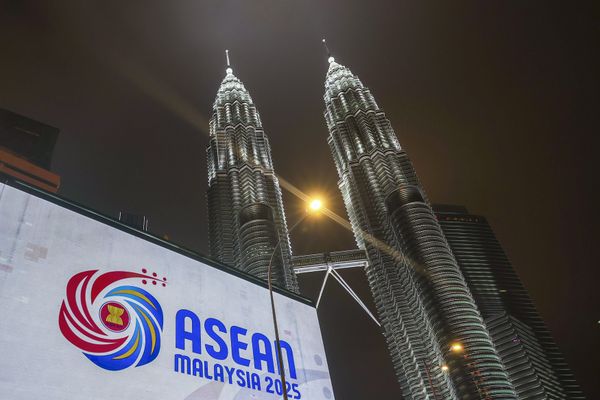By Danial Dzulkifly
KUALA LUMPUR, April 10 — As sweeping US tariffs cast a shadow over global trade, Prime Minister Datuk Seri Anwar Ibrahim seized the opportunity at the opening of the Asean Investment Conference (AIC) 2025 to deliver a clear message: Unity, not fragmentation, must define Asean’s next chapter.
Held at the Kuala Lumpur Convention Centre from April 8 to April 10, the high-level summit brought together policymakers, industry leaders, and economic thinkers at a time of escalating uncertainty.
United States (US) President Donald Trump's announcement on April 2 to impose blanket tariffs, reaching up to 49 per cent on some Asean exports, has sent shockwaves through the region’s economies, with Malaysia among the hardest hit.
Anwar’s speech at the conference, while diplomatically measured, marked a strategic shift in tone, urging Asean to strengthen its resilience and reinforce intra-bloc trade, as well as foster closer ties with its dialogue partners: China, Japan, and South Korea.
[caption id="attachment_396604" align="alignleft" width="395"] Prime Minister Datuk Seri Anwar Ibrahim delivers the keynote address at the Asean Investment Conference 2025, on the sidelines of the 12th Asean Finance Minister and Central Bank Governors’ Meeting, at the Kuala Lumpur Convention Centre on April 8, 2025. — Picture by BERNAMA[/caption]
Prime Minister Datuk Seri Anwar Ibrahim delivers the keynote address at the Asean Investment Conference 2025, on the sidelines of the 12th Asean Finance Minister and Central Bank Governors’ Meeting, at the Kuala Lumpur Convention Centre on April 8, 2025. — Picture by BERNAMA[/caption]
“Asean stands out as a beacon of hope and positivity. We are still broadly committed to openness, cooperation and institutional continuity, but Asean must now rely more on itself,” he declared.
Anwar’s remarks set the tone for three days of candid conversations on trade resilience, the limitations of existing Asean frameworks, and the urgent need for innovation in both economic structures and political will.
A fragile facade of integration
Despite over two decades of market liberalisation, the Asean Economic Community (AEC) remains more a statement of intent than a fully functioning single market.
Former CIMB Group chairman cum Asean Business Advisory Council (BAC) chairman Tan Sri Nazir Razak did not hold back in his assessment, stating that the region has over-promised and under-delivered for too long.
“If Asean cannot bind together stronger now, if it cannot turbocharge economic integration workstreams now, when can we?
“Really, it should be about achieving tangible, piecemeal progress, not grand plans… despite the fact that politicians always love grand plans,” he remarked during his keynote address at the Asean Investment Conference on Tuesday (April 8).
[caption id="attachment_396711" align="alignright" width="410"] Asean Business Advisory Council chairman Tan Sri Nazir Razak delivers his keynote speech at the Asean Investment Conference 2025 in conjunction with the 12th Asean Finance Ministers and Central Bank Governors Meeting, at the Kuala Lumpur Convention Centre on April 8, 2025. — Picture by BERNAMA[/caption]
Asean Business Advisory Council chairman Tan Sri Nazir Razak delivers his keynote speech at the Asean Investment Conference 2025 in conjunction with the 12th Asean Finance Ministers and Central Bank Governors Meeting, at the Kuala Lumpur Convention Centre on April 8, 2025. — Picture by BERNAMA[/caption]
Nazir suggested a focus on practical steps, like accelerating the use of the Asean Business Entity (ABE) and simplifying regional capital market access through joint initial public offering frameworks.
He believes these tools could unlock real commercial synergy, particularly for countries like Malaysia and Indonesia.
Nazir’s argument reflects a growing sentiment that the time for symbolism is over, as with geopolitical rivalries now shaping trade and investment flows, Asean’s credibility may hinge on its ability to deliver tangible outcomes for its member states.
A wake-up call from Washington
While the full economic impact of the new tariffs remains uncertain, prominent economist Tan Sri Andrew Sheng warned that the shock would be most acute for small and medium enterprises (SMEs), the very demographic often hailed as the engine of Asean’s growth.
“If you are suddenly required to pay up to 40 per cent in cash upfront just to get your goods into the US, and your profit margins are only 10 or 15 per cent, you would likely go bankrupt,” he said.
Describing the current moment as a form of “announcement shock”, Sheng predicted that the ripple effects, including project delays, reduced cash flow, and investor hesitation, would likely deepen over the coming quarters.
His proposed solutions went beyond short-term damage control. For example, he recommended regional currency settlements, AI-enabled productivity tools, and equity-based finance models rooted in Islamic finance principles, which he feels will build long-term resilience.
These ideas hold particular relevance for Malaysia, especially in Selangor, where SMEs, digital start-ups, and manufacturing hubs form the backbone of the state’s economy.
Malaysia's diplomatic balancing act
While some voices at the conference called for a firmer response to the tariffs, Malaysia has opted for diplomacy.
Investment, Trade, and Industry Minister Tengku Datuk Seri Zafrul Tengku Abdul Aziz confirmed that a delegation would head to Washington by the end of the month to seek exemptions and express concerns over the tariffs.
“Malaysia’s position, as announced by Prime Minister Datuk Seri Anwar Ibrahim, is that we must remain calm while at the same time engaging and understanding the issues we feel are unfair to Malaysia.
“We do not want to see an escalation. A trade war will not benefit anyone. That is our opinion. We will continue our communication efforts. Our group in Washington is already working, and we have a meeting scheduled in Washington as well as a meeting at the World Trade Organisation,” he said.


